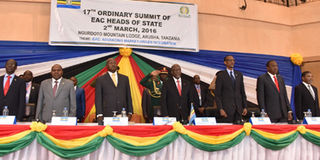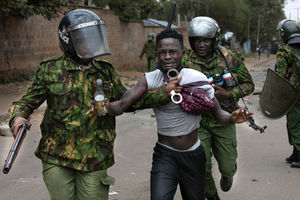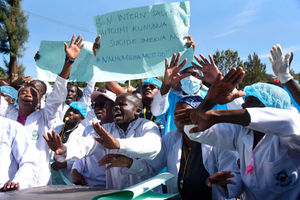A scratching of heads as EAC heads of state meet

President John Magufuli and other East African Community leaders during the 17th Ordinary Summit of EAC Heads of State meeting in Arusha last year. The presidents are meeting again on Saturday. PHOTO I FILE
What you need to know:
- Apparently, as the leaders finally meet in Dar es Salaam, the main issue of interest will be what direction to take for the Community that has of late been dogged by fresh cracks, and a financial crisis, which derailed the implementation of key projects.
Dar es Salaam. Tanzania will this Saturday host East African Community (EAC) leaders for the much-awaited regional bloc’s Heads of State Summit. So much is at stake ahead of the high-profile meeting that was thrice postponed over the past few months at the request of the hosts, Burundi and Kenya.
Apparently, as the leaders finally meet in Dar es Salaam, the main issue of interest will be what direction to take for the Community that has of late been dogged by fresh cracks, and a financial crisis, which derailed the implementation of key projects.
Granted, it has been a rough year for the EAC.
Member states are still entangled in the confusion that was brought by the tricky trade deal with the European Union – with Kenya and Rwanda on one side pushing for the ratifying of the Economic Partnership Agreement (EPA) and Tanzania leading a splinter group that is against the pact.
Last September, the EAC presidents met in the wake of Tanzania’s stiff opposition to the deal. It was during the meeting that the leaders decided to give technocrats more room for consultations on EPAs and to review their position in January.
But there is no sign yet that member states will reach common ground. Kenya has, since 2007 been pushing for the deal to be concluded with speed. Being the only developing state in EAC (the rest are classified as Least Developed Countries that enjoy duty-free trade with EU without reciprocating), Kenya has had to lobby its partners to endorse EPA because of the shared customs territory.
Earlier in the year, Tanzania opted to pull out of a joint deal hammered by the bloc’s ministers to have the region sign EPAs collectively.
Parliament, which has the power to ratify such trade deals, voted to block the country from signing the EPA.
And recently, there was disgruntlement from some quarters in Kenya, which somehow felt “betrayed” by her siblings in the Community after losing the African Union Commission chairperson’s post.
Writing for the Daily Nation after the election in Addis Ababa, Ethiopia, Mr Magaga Alot, a former EAC staffer, said the regional bloc was at a major crossroads.
He seemed to be pointing an accusing finger at other member states when he described the loss of Kenyan Foreign Minister Amina Mohamed as “the latest salvo in a furious wave of discordance in the East African Community”.
“The EAC partners are doggedly putting their differences and national interests first instead of embracing the cause of regional integration… The betrayal in Addis could well be Kenya’s Ides of March; even more, it’s the EAC’s wake-up call to engage in a major conversation and re-strategising to put regional integration back on track.”
But it is the fallout over the EPA deal that sparked speculation that the regional leaders are unwilling to meet at a time there is so much disagreement.
Tanzania requested the summit to be pushed back to allow for time to consult on whether the EAC–EU Economic Partnership Agreement was viable.
However, Kenya’s Principal Secretary for East African Affairs Betty Maina was recently quoted in The East African as saying there was no cause for alarm in the summit delay. “Although decisions on key matters are pending, it can only be a big issue if the presidents go for a year without meeting,” said Ms Maina.
No more postponing
“We are hoping that there will be no more postponing from the current date. Burundi has confirmed availability for that day and we are waiting for the other partner states to do so.”
Another sticking issue is funding.
The East African Legislative Assembly (Eala) recently raised concern over the delays by partner states in remitting their budgetary contributions to the EAC Secretariat.
A meeting of the regional bloc’s legislative body in Kigali, Rwanda, last month, MPs passed a resolution urging the Council of Ministers to find a common stance on partner states funding deficit by having it on the agenda of the Saturday summit.
In a heated debate, the lawmakers partly heaped blame on the Council, including the chairperson of the Council of Ministers, Dr Susan Kolimba (Tanzania) for not doing enough to ensure member states meet their financial obligations – which “has completely disrupted activities of the Community.”
“You cannot even be able to say that you have commitment for integration when you look at these figures. Are we really serious about integration? All partner states have arrears,” said MP Nancy Abisai (Kenya), the mover of the motion.
By the beginning of the year, Burundi (whose man is currently in charge of the Secretariat) had not paid anything for the 2016/2017 budget. Of the $101,374,589 2016/17 budget, each of the five member countries was expected to contribute $47.5 million while the development partners raise $46.7 million compared with $58.5 million they disbursed to EAC for 2015/2016 financial year. The rest of the funds will come from other sources.
No respite in sight
Yet, there is no respite in sight for the funding crisis considering the economic situations in most of the member states. And the 2017/18 EAC budget will be relatively smaller compared to that for the current financial year.
The Secretariat got about $12 million less for its expenditure during the 2016/2017 financial year compared to what it received for the 2015/2016 fiscal year as the Community embarked on cost-cutting due to dwindling support from donors.
Interestingly, a recent International Monetary Fund (IMF) report revealed that member states of the East African Community are now greatly outperforming the economies of most countries in the sub-Saharan region.
According to the IMF, the economic expansion rate for the region as a whole dropped to 1.4 per cent last year, but that was the slowest rate in more than 20 years and below the level needed to keep pace with a burgeoning population growth.
The IMF regional survey presents a generally bleak appraisal that runs counter to the “Africa Rising” narrative that has taken hold in recent year.




